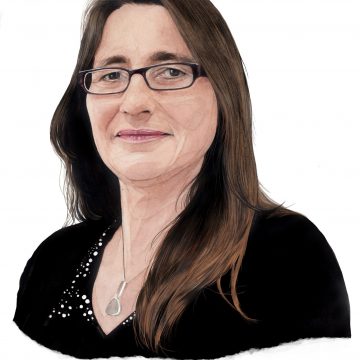Unearthing how people in Nigeria lived 2,000 years ago
Archaeologist Chioma Vivian Ngonadi’s literally groundbreaking PhD research in Igboland is revealing the area’s dynamic history.

Food is crucial to the survival of human life and so it is unsurprising that it is also a significant aspect of society. In ancient cultures, the adoption of agriculture represented a vital change in lifestyle – the resulting potential for food resources has become associated with the emergence and development of complex societies. The act of plant cultivation, harvesting and utilisation creates a picture of a community’s identity and social interactions. Understanding food expands the archaeological view of how people organised themselves and their relationship with others.
My research focuses on a small village called Lejja, in Igboland, south-eastern Nigeria. We know that iron smelting flourished in this region on an industrial scale from around 2000 BC: the huge number of slag blocks on the surface reveals that iron working here was a highly sophisticated, long-lived and well-developed tradition, with techniques that involved relatively large-scale metal production.
This could be one of the first studies to effectively integrate research on metal technology with that on the broader food economy in west Africa
But despite the evidence suggesting human activity from at least the Palaeolithic period, scientific studies on ancient food-producing societies here are rare. They are also mostly based on hypothetical assumptions drawing on oral history and ethnographic data. No site in this region has been investigated in significant detail for subsistence reconstruction. Consequently, the lack of scientific research on archaeological data on food production and plant exploitation in the deeper past have limited our understanding of the prehistoric subsistence and food history of this area.
I wanted to change this. My research focuses on conducting a thorough empirical and archaeological investigation into the histography of food-ways and agriculture in south-eastern Nigeria, by bringing together archaeological data with historical, botanical and material science techniques. I am aiming to find out how west African iron smelters in Lejja 2,000 years ago sustained life and integrated with the quest for food. This research will inform our understanding of the human-landscape relationship with emphasis on the plant foods exploited, the vegetation, technology and land-use patterns.
Much of this project has focused on how plant food resources were managed – particularly which plants were cultivated (as opposed to traded) and how subsistence practices have changed through time. Our archaeological survey and excavation has revealed that the people who inhabited Lejja in the past had a dynamic agricultural history, technological ingenuity and large, deeply stratified settlements. And it is also reflected in the diverse array of archaeological materials we have uncovered, namely pottery (decorated and undecorated), iron objects, charcoal, iron slag, tuyère fragments, iron ores, hammer stones and macrobotanical remains. Of these, the most common plant remains are oil palm, rice, tiger nut, cowpea and clove: suggesting a rich local diet.
Although the project is not complete, it has already revealed a picture of the history of food production, human occupation and the subsistence practices of the area.
Although the project is not complete, it has already revealed a picture of the history of food production, human occupation and the subsistence practices of the area. It has also demonstrated that archaeobotanical remains can be identified from an archaeological context in south-eastern Nigeria, despite the poor potential for the preservation of plant remains in the tropics.
And, at a broader level, it will contribute to discourse in African studies and archaeology on the emergence of agriculture, craft specialisation and social complexity. Elsewhere in west Africa, we know relatively little about early metal-producing communities beyond the technology they employed. This could be one of the first studies to effectively integrate research on metal technology with that on the broader food economy in west Africa, thereby adding an important case study to an extremely sparse archaeological record.
King’s fourth-year PhD student, Chioma Vivian Ngonadi, is a Gates Scholar in the Department of Archaeology. Find out more about the work of Gates Scholars.







